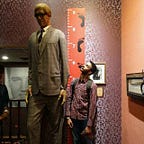A Shopaholic’s Guide To Never Indulging Again
A quick guide to not buying something you don’t need.
Shopping is not a legitimate hobby. Yes, you read that right. Neither is it something to be done when you’re looking to pass a few hours.
Unnecessary Shopping Was Invented
Yup.
Back in the day, owning a lot of things was a thing only the super-rich could afford. Clothes were stitched by personal tailors and dinner sets were family heirlooms.
The others owned fewer things. Things like clothes had to be hand stitched, so naturally, they were expensive. People didn’t have money left (and neither did they have the desire) to buy fancy artifacts which were essentially useless.
These people had a few shirts, a few trousers or skirts, a pair of shoes and a coat. More than that was simply not affordable. It also resulted in people taking care of their precious belongings.
Then came the industrial revolution. A lot of manual work was automated to a great extent. Suddenly, there were a lot of things to shop as they were manufactured at scale.
This resulted in a massive drop in the cost of innumerable items.
Soon enough, the few shirts converted to a lot of shirts, the few trousers and skirts to a boatload of them, and the single pair of shoes to a closetful of shoes.
People used to go to the shop because they needed to buy something. When the manufacturing industry started booming and the costs dropped, they went to the shop just because they could.
This was revolutionary. People now had options.
Enter the Diderot Effect
Now that things were cheaper, more people could afford them. Companies now had more manufacturing capacity and they needed to sell their produce.
Once you buy something which is considered premium by yourself or the society, you invite yourself to be trapped in what is widely known as the Diderot Effect.
The Diderot Effect states that obtaining a new possession often creates a spiral of consumption which leads you to acquire more new things. As a result, we end up buying things that our previous selves never needed to feel happy or fulfilled.
The Diderot Effect can be spotted in numerous areas of life:
- You buy a gym membership and you suddenly start purchasing new gym clothes, wrist straps, new shoes (even though have plenty of them).
- You buy a new dress and now you must have matching earrings, heels, and a purse (or purses?).
- You buy an expensive rug and you begin reconsidering if you need a new coffee table and chairs, or maybe even a new couch.
We rarely look to decrease the number of material possessions we have. It is human nature to keep adding, accumulating and building upon what we already own.
“The pressure to upgrade our stock of stuff is relentlessly unidirectional, always ascending”- Juliet Schor
Getting over the want to buy more
Getting over this temptation demands a massive amount of self-discipline at the beginning, but it gets a lot easier with practice.
- Avoid the triggers: Almost all habits, including shopping, begin with certain types of repetitive triggers or cues. That said, one of the most efficient ways to have control over this habit is to avoid the triggers altogether. Unsubscribe from the unnecessary mailing lists. Meet with people at parks or coffee shops instead of malls. Use tools like Freedom to block your favorite shopping websites.
- Only buy things which fit with things you already own: Buying something doesn’t have to buy more things. When shopping for clothes, look for something that goes with the clothes and accessories you already possess. Try buying electronics for which you can use the chargers, cables, etc you have from other products.
- Buy one, give one: Each time you purchase something new, see if you can give away or sell something. Bought a new chair or a dinner set? Consider removing the old one from your house in some or the other away rather than shifting it to another room or stashing it in some closet.
- Don’t fall for the ‘discount’ scam: Entering a shop solely because they are offering a huge discount on products is like going to buy a car because it is discounted, even when you already have a car which you don’t even use. Also, what most people don’t realize is that they end up buying a lot of products and spending a lot more money when shopping during a sale than they would when they enter the shop with the intention of buying a product at it’s marked price. And that brings us to the next point.
- Buy only what you need for the next week, nothing more: What makes shopping so exciting for some is that it allows the mind to run free. Occurrences of “I can use that umbrella when we go to the beach in the summer!!” when you haven’t even planned your vacation, are far too common. Don’t let imagination divert your attention from the cost and practicality of an object, nor from the reality of your future plans with the object. Before making a purchase, ask yourself it will be needed during the next week. If the answer is a firm ‘no’ or a ‘not likely’, pass.
In Conclusion
If you are a shopaholic or just someone who accidentally wanders into shops, keep in mind that getting over the need to buy more is not only good for your savings but also really beneficial for the environment.
So the next time you look at the clothing racks at the mall and feel that you have to own those trendy new clothes, give those clothes a smile and move on.
Thanks for reading, sharing, and following! :)
